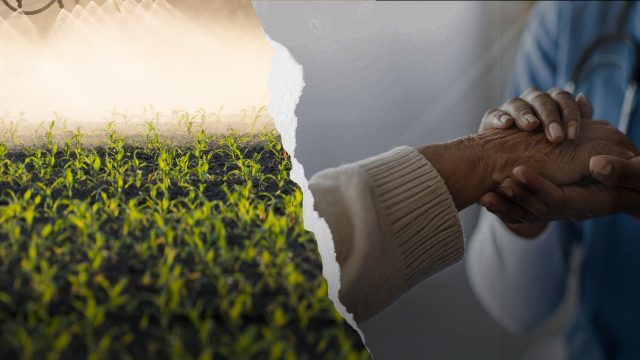21
Nov
National Webinar To Hear From Science and Medical Experts on Existential Health Threats of Pesticide Use

(Beyond Pesticides, November 21, 2025) “How do we respond when told that the solution to ubiquitous and hazardous toxic chemicals in our lives (in our air, food, water, soil, on farms, in parks, playing fields, and schoolyards) is a reduction in their use that continues to allow unnecessary toxic chemical dependency and poisoning? Do we accept partial restrictions of pesticide use, despite the availability of cost-effective alternatives that stop the toxic assault and help to prevent the most serious associated diseases that invade and attack our bodies, our loved ones, our families, and our communities—with breast cancer, prostate and testicular cancer, pediatric cancer, infertility, and more?”
These are the questions being asked about the most prevalent cancers in the U.S. and worldwide at the upcoming 2nd Session of the National Forum, The Pesticide Threat to Environmental Health: Advancing Holistic Solutions Aligned with Nature, scheduled for December 4, 1:00-3:30pm (EST). ️➡️ Link to register
The Forum brings together cutting-edge science and medical experts from Brazil, Italy, Belgium, Rwanda, Canada, and the United States to sharpen the voices of advocates who are saying that the time for action to eliminate the current reliance on petrochemical pesticides and fertilizers is past due and the transition away from them is now urgent. The speakers bring years of experience in research and clinical work, writing articles in peer-reviewed journals that characterize the dimensions of health threats that call for urgent action to stop toxic chemical use, according to Beyond Pesticides, the convenor of the Forum. The Forum helps to make important findings accessible to the lay public so that they can inform local and state decisions in the U.S. and across the globe.
This Forum session follows an earlier session in October that brought together robust presentations on the critical benefits of land management in sync with nature, with experts explaining the importance of ecosystem services—recognizing the value of ecological balance and the importance of healthy ecosystems on which life depends. A recording of the session can be found here.
Speakers at the Forum, 2nd Session, December 4, 2025
 Carolina Panis, PhD—associate professor of medicine at Western Paraná State University (UNIOESTE, Brazil) and visiting researcher at Harvard University and the University of Arizona—writes in her research findings, Pesticide exposure and increased breast cancer risk in women population studies, that a number of pesticides “can increase the risk of BC [breast cancer] development through various mutagenic [genetic mutations] and nonmutagenic mechanisms and can act directly as carcinogens or indirectly as biochemical modifiers and hormonal deregulators. The underlying mechanisms include endocrine disruption; genotoxicity; epigenetic changes [changes to gene function without changing DNA]; enhanced cell migration, invasion, and. . .” more.
Carolina Panis, PhD—associate professor of medicine at Western Paraná State University (UNIOESTE, Brazil) and visiting researcher at Harvard University and the University of Arizona—writes in her research findings, Pesticide exposure and increased breast cancer risk in women population studies, that a number of pesticides “can increase the risk of BC [breast cancer] development through various mutagenic [genetic mutations] and nonmutagenic mechanisms and can act directly as carcinogens or indirectly as biochemical modifiers and hormonal deregulators. The underlying mechanisms include endocrine disruption; genotoxicity; epigenetic changes [changes to gene function without changing DNA]; enhanced cell migration, invasion, and. . .” more.
 Rossella Cannarella, M.D., PhD—endocrinology specialist and European Academy of Andrology (EAA) certified clinical andrologist at the Division of Endocrinology, Metabolic Diseases and Nutrition, University of Catania (Italy)—writes in the report she authored, Chemical Pollution and Men’s Health: A hidden crisis in Europe (published by Health and the Environment Alliance in Brussels), “Mounting scientific evidence links exposure to harmful environmental chemicals—such as endocrine disrupting chemicals (EDCs), persistent pollutants, and microplastics—to a range of serious male health outcomes, including prostate and testicular cancer, infertility, sexual dysfunction, hormonal imbalances, and impacts on descendants’ health.” Dr. Cannarella identifies numerous pesticides as known endocrine disrupting chemicals and reproductive toxicants and writes, “Adult occupational exposure to pesticides (organophosphate and carbamate insecticides) is linked to declines in sperm concentration, poorer semen quality, and reduced testosterone levels. . . [and] Commonly used pesticides like glyphosate and organophosphates have been shown to disrupt the hypothalamic-pituitary-gonadal axis in animal models.”
Rossella Cannarella, M.D., PhD—endocrinology specialist and European Academy of Andrology (EAA) certified clinical andrologist at the Division of Endocrinology, Metabolic Diseases and Nutrition, University of Catania (Italy)—writes in the report she authored, Chemical Pollution and Men’s Health: A hidden crisis in Europe (published by Health and the Environment Alliance in Brussels), “Mounting scientific evidence links exposure to harmful environmental chemicals—such as endocrine disrupting chemicals (EDCs), persistent pollutants, and microplastics—to a range of serious male health outcomes, including prostate and testicular cancer, infertility, sexual dysfunction, hormonal imbalances, and impacts on descendants’ health.” Dr. Cannarella identifies numerous pesticides as known endocrine disrupting chemicals and reproductive toxicants and writes, “Adult occupational exposure to pesticides (organophosphate and carbamate insecticides) is linked to declines in sperm concentration, poorer semen quality, and reduced testosterone levels. . . [and] Commonly used pesticides like glyphosate and organophosphates have been shown to disrupt the hypothalamic-pituitary-gonadal axis in animal models.”
 Génon Jensen—founder and executive director of Health and Environment Alliance (HEAL), in Brussels and operating throughout Europe, and an official member of the World Health Organization’s (WHO) European Environment and Health Task Force—writes in the men’s health report (cited above), “This report shows that the male reproductive system is particularly vulnerable to chemical exposures. The growing evidence on how hazardous chemicals contribute to rising cancer rates and infertility is truly worrying. With the upcoming REACH revision, EU policymakers have a unique opportunity to prevent disease, boost reproductive health and ensure the wellbeing of future generations.”
Génon Jensen—founder and executive director of Health and Environment Alliance (HEAL), in Brussels and operating throughout Europe, and an official member of the World Health Organization’s (WHO) European Environment and Health Task Force—writes in the men’s health report (cited above), “This report shows that the male reproductive system is particularly vulnerable to chemical exposures. The growing evidence on how hazardous chemicals contribute to rising cancer rates and infertility is truly worrying. With the upcoming REACH revision, EU policymakers have a unique opportunity to prevent disease, boost reproductive health and ensure the wellbeing of future generations.”
 Jabeen Taiba, PhD—postdoctoral research associate in the Water, Climate, and Health Program, who served as the lead researcher for “Exploring the Joint Association Between Agrichemical Mixtures and Pediatric Cancer”—writes: “Nebraska’s age-adjusted incidence rates for childhood cancers are among the highest in the US. . .We evaluated the joint association between the agricultural mixture and pediatric cancer. . . We observed a statistically significant positive association between the 32 agrichemicals and overall pediatric cancer and subtypes.”
Jabeen Taiba, PhD—postdoctoral research associate in the Water, Climate, and Health Program, who served as the lead researcher for “Exploring the Joint Association Between Agrichemical Mixtures and Pediatric Cancer”—writes: “Nebraska’s age-adjusted incidence rates for childhood cancers are among the highest in the US. . .We evaluated the joint association between the agricultural mixture and pediatric cancer. . . We observed a statistically significant positive association between the 32 agrichemicals and overall pediatric cancer and subtypes.”
 Emile Habimana, M.S.—doctoral candidate specializing in Environmental Analytical Chemistry at the Université de Montréal, Quebec, Canada, having previously worked for the Ministry of Natural Resources in Kigali, Rwanda—evaluates emerging contaminants in sewage sludge/biosolids that characterize the pervasiveness of exposure to chemical mixtures and highly toxic compounds formed in the environment as transformation products or metabolites. In his article in Frontiers in Environmental Chemistry, he identifies 414 contaminants of emerging concern (CECs) in soils, untreated and treated sewage sludge (biosolids), compost, and dust, across 151 peer-reviewed studies released between 2018 and 2023—emphasizing the range of potential exposure pathways across various products that include classes of pesticides like neonicotinoid insecticides and triazine herbicides such as atrazine, (PFAS), plastic-related compounds, and their transformation products in complex systems, such as sewage sludge, biosolids, composts, and soils. Mr. Habimana is the developer of an innovative, high-throughput multiresidue test that has facilitated simultaneous quantification of over 70 contaminants.”
Emile Habimana, M.S.—doctoral candidate specializing in Environmental Analytical Chemistry at the Université de Montréal, Quebec, Canada, having previously worked for the Ministry of Natural Resources in Kigali, Rwanda—evaluates emerging contaminants in sewage sludge/biosolids that characterize the pervasiveness of exposure to chemical mixtures and highly toxic compounds formed in the environment as transformation products or metabolites. In his article in Frontiers in Environmental Chemistry, he identifies 414 contaminants of emerging concern (CECs) in soils, untreated and treated sewage sludge (biosolids), compost, and dust, across 151 peer-reviewed studies released between 2018 and 2023—emphasizing the range of potential exposure pathways across various products that include classes of pesticides like neonicotinoid insecticides and triazine herbicides such as atrazine, (PFAS), plastic-related compounds, and their transformation products in complex systems, such as sewage sludge, biosolids, composts, and soils. Mr. Habimana is the developer of an innovative, high-throughput multiresidue test that has facilitated simultaneous quantification of over 70 contaminants.”
GET THE FACTS FROM CUTTING EDGE SCIENTISTS on pesticides and breast cancer, pediatric cancer, and sewage sludge/biosolids! ️ Jay Feldman, executive director of Beyond Pesticides, moderating. Registration provides access to all sessions of the Forum!
We look forward to welcoming you back! Please share and help us spread the word! ️➡️ Link to register
All unattributed positions and opinions in this piece are those of Beyond Pesticides.











